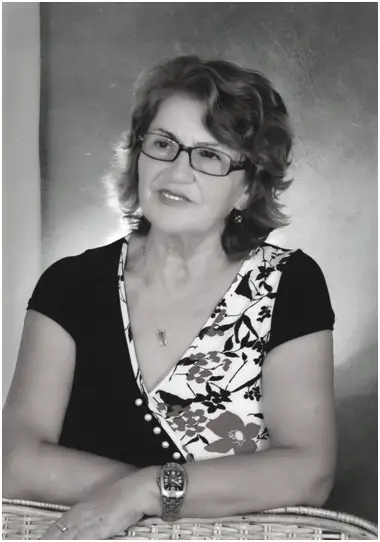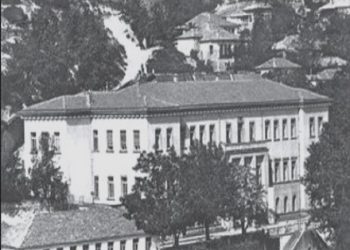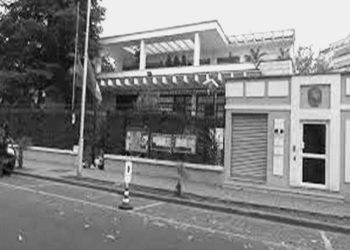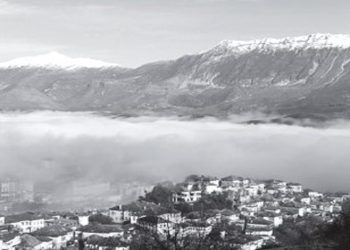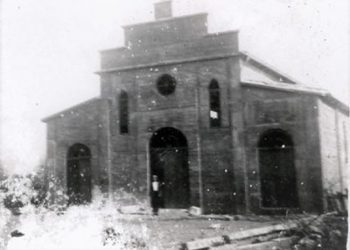Memorie.al / whether we have taken the story as true, or whether her deeds have turned into myths, in our imagination, the unprecedented act of the Maid of Orléans during the time of Charles VII, Joan of Arc (Jeanne d’Arc), who in 1810 became an inspiration for the pen of the great Schiller, did not cross the borders of France. And we have forgotten that in life, in the clash with evil, oppression, and injustice, Joan of Arc figures can be found in every country, even though their fight was not waged with weapons and armies, but with other means, such as, for example, the power of free speech. And one such person is, undoubtedly, the distinguished writer from Vlora, the worthy daughter of legendary Kanina, Vilhelme Vranari.
If one starts from the late period, that is, after the fall of communism, when she began to publish an endless number of books, from the artistic values they contain, the genres she cultivated, and the courage with which she expresses her thoughts and reprimands – hence, from her democratic inclinations and convictions – and especially from her concern for the fate of the Homeland and the priority she gives to the love for her birthplace, we can confidently say that in the ranks of intellectual women in general and women writers in particular, it is difficult to find her equal. And let’s not exclude her age, her difficult health condition, and her daily family preoccupations.
Naturally, a question arises: Why does this woman, who at first glance seems like all the others, who has no ambition for a career, thus, without any interest or gain, torment herself so much to write and publish, at a time when people are increasingly moving away from writings and books, to their detriment? The answer is given by her in a brilliant passage in the introductory speech of the trilogy “Look at the Medusa,” where she writes: “It was a moral obligation towards those lives that were extinguished, those countless dreams that vanished, and those hopes that were mercilessly killed for half a century. It was a commitment to all those who were denied a smile, a dream, youth, just so they would not be themselves. I dedicate it to those mothers, examples of virtue and fidelity, who experienced hell to bring forth ‘man.’
How could I forget those vital women who, under the lash of the savage time, did not cease crossing the muddy roads? The bags on their backs were heavier than the enslaving shackles on the hands and feet of men. It was a moral responsibility towards the intellectuals who wasted their knowledge and scientific thought in cells, prisons, swamps, and mines. For those young people who fertilized the earth and became the beds of mosquitoes, leeches, or snakes in the mud of canals and swamps. Those saplings, which, for a fraction of freedom, had placed the sign of equality between life and death. For this virgin land, for this rich and beautiful and extremely poor country, which they transformed into a gigantic cemetery, filled with nameless graves. For this sacred and ancient soil, as old as the world itself turned into a large prison where there were only prisoners and guards. For all those who were denied knowledge and profession by being told: ‘Enough! This world no longer belongs to you! You belong to the world of suffering and pain!'”
But more than anything else, it seems that the sad truth that torments Vilhelme Vranari is that even today, after more than three decades, the communist mentality is raising its head, and the nostalgics still continue to play the pipe with the same sickening melody. The hands of their clock, even though they declare themselves for capitalism, for the EU and America, have remained stuck in communism and Enver Hoxha. And the misfortune is that in this paradox, many foreign emissaries join in, supporting those whom they cursed, hated, and smeared as nowhere else on the planet, and opposing those whom they condemned even to execution by firing squad and hanging because they expressed sympathy and admiration for Europe and the USA.
We live in strange times, undecipherable practices and attitudes, arrogant politics, intrigues disguised in the name of democracy, arbitrary dictation and conqueror-like behavior, application of the principle “Divide and rule,” which will have inevitable repercussions on our exhausted and bewildered people, where even to this day, the quarrel between partisans and Ballists, communists and nationalists, has not ceased. And the evil is that even our own politicians have fallen into this mess, having cheaply sold the honor of our homeland, so much so that they will jump down your throat if you mention that we are a sovereign country. It is precisely this reality that pushes Vilhelme Vranari to remember once again: “Class divisions arouse resentment, hatred, and revenge. Where there is justice, repentance, forgiveness, tolerance, harmony, brotherhood, cooperation, and the granting of deserved intellectual values, the path towards national prosperity is certain.”
Therefore, she does not stop writing, to expose the brutal interventions of false friends, of those who continue to leave Albania fragmented, while simultaneously reminding Albanians of the necessity of abandoning meaningless quarrels and of love and understanding with one another. Because it is us, and no one else, who will make this blessed country happy and prosperous? With this conviction, she declares: “When true national values are the guiding light for Albanians in every field of life, without asking where they come from – from the left, the right, or the center – then Albania will be made, and the Albanians themselves will make it.”
Clear in what she constantly says, courageous in all that she puts forth, argumentative and full of logic in the facts she provides, a contributor to the most essential issues of the Nation, Vilhelme Vranari is not only listed among the great women of the country but can also be metaphorically compared for all she does to the 19-year-old girl who, with her fiery call, led the masses for the liberation of Orléans in the 15th century. As for us, her friends, we wish her, riding on the Pegasus that emerged from the blood of Medusa Gorgon, just like the Goddess of the Dawn Eos, who rose to the sky with her husband Tithonus, spreading light upon the earth, to climb even higher with her loyal husband, Fitim (Victory), spreading goodness and love everywhere among Albanians. Memorie.al





